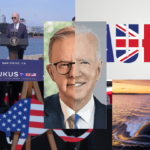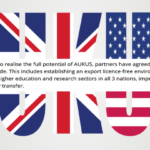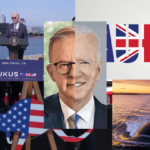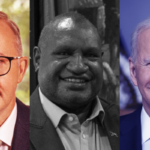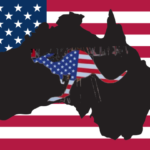US Congressman Asserts Darwin the “Epicentre” of War on China, as Nuke Subs on Their Way
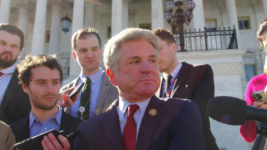
“The shift which we need to see is from viewing AUKUS as defence policy, to viewing it as nation-building policy – or even economic future-proofing policy,” Bran Black, Business Council of Australia CEO, was quoted as saying at the end of an article about this continent becoming a “central base” of US military operations in the Indo Pacific.
The main thrust of the piece in the Weekend Australian was an exclusive conversation that the Murdoch press had with US Republican congressman Michael McCaul, who waxed lyrical about the opportunities that the tearing down of military trade barriers that the Albanese government has recently partaken in brings in terms of a deterrence upon China and the lead up to World War III.
Indeed, during his 10-day visit to this country, McCaul, the chair of the US House Committee on Foreign Affairs announced that the Biden administration had granted defence trade exemptions from the US for us, which means it has relaxed its International Traffic in Arms Regulation (ITAR) red tape.
“I am pleased the administration has finally provided the long overdue defence trade exemption to two of our closest allies, Australia” and the UK, a 15 August statement outlines. But the US politician then laments that the reforms have not completely abolished “big government regulation”, which will continue to “hamper” deterrence capabilities in the Indo Pacific.
Nuclear submarines appearing soon
“Darwin is the… epicentre of the organisation projecting power through the South China Sea to China,” McCaul told Sky News, following a visit to the Northern Territory capital last week. “And getting these alliances there sends a very strong message to Chairman Xi, that the risk outweighs the reward.”
Then in response to a question about how soon he thought “we’d have nuclear-powered submarines in Australia”, the American said “I think that you’re going to see rotations soon, and the fact that the certification on Pillar II, which is the innovation and technology, will come out in the States, probably later today” means that Australia will soon be hearing about their arrival.
This is significant as, when the AUKUS optimal pathway, or Pillar I, was announced in March 2023, it involved the establishment of the US-UK Submarine Rotational Force – West, which will involve four US nuclear-powered submarines (SSN) and one from the UK, rotating out of HMAS Stirling, on Garden Island, off the coast of Boorloo-Perth, by 2027, yet, according to McCaul, it can now begin.
And as for questions about whether a new Trump administration would honour the agreement, McCaul suggested that laws facilitating AUKUS, which passed in the US late last year, were bipartisan, and he added that the idea for AUKUS was established under the last Trump administration, when then US secretary of state Mike Pompeo first broached it with the Australian head of intelligence.
Full integration into the US war machine
The United States Study Centre released the AUKUS Enablers? Assessing Defence Trade Control Reforms in Australia and the United States report on Wednesday.
The USSC was a Howard government initiative established at Sydney University in 2006, with the aim of creating greater understanding between the two nations, as well as providing coursework for university students.
And the report outlines that the “harmonising of defence control regimes” here and in the UK over the last 12 to 18 months, has resulted in the removal of licensing restrictions on around 70 to 80 percent of trilateral defence trade “reducing certain compliance costs for industry and greasing the wheels of everyday defence industrial and technology cooperation between the AUKUS countries”.
“Once implemented, these reforms will mark a significant step towards genuine defence industrial and technology federation between the three partners,” the centre states, adding that “of particular note” are allowances around ITAR and Export Administration Regulations (EAR), which are US guidelines and prohibitions that govern sensitive trade exports.
McCaul was involved with the passing of the US National Defence Authorisation Act for Fiscal Year 2024, which provided the foundational laws for the AUKUS agreement to proceed, while federal Labor passed the Defence Amendment (Safeguarding Australia’s Military Secrets) Bill 2024 and the Defence Trade Controls Amendment Bill 2024, which open up the trade barriers for US integration.
But the AUKUS Enablers report warns that if further trade barriers are not removed it would “stymie cooperation through AUKUS Pillar II and hamper alliance initiatives on precision-guided weapons” and as it stands, if the further reforms aren’t implemented it could result in AUKUS relevant technologies that are commercial and dual-use goods not benefiting from export harmonisation.
The report then makes clear that what these laws are creating is an Australian and UK emulation of the US defence trade controls regime and to maximise “AUKUS defence trade harmonisation” all three countries will have to “address a range of legal, political, and technical challenges at the unilateral and trilateral level”, as well as ensure that ITAR issues are not replicated in this jurisdiction.
Just like the 1930s
“History does repeat itself, and I don’t want it to repeat itself in the Pacific,” the US congressperson continued on Sky. And in elaborating he explained that he meant “in terms of a world war”, as threats in Europe and the Pacific have not been at the scale they are at “since World War II”. And in raising Russia and China, he then goes on to cite Iran as the third enemy in the coming world war.
“Because of Afghanistan, because of the failures to put sanctions on China, who have revitalised the Russian military,” McCaul continued, as he hovered between establishing a deterrence and a full-scale war. “When they see weakness, our enemies become empowered, and they feel emboldened right now and that’s why president Xi is being so aggressive. He is emboldened”.
The US congressperson further cited the outcomes of this year’s AUSMIN meeting a fortnight ago, which saw the Australian foreign and defence ministers signing off on more frequent rotations of US nuclear-capable maritime patrol and reconnaissance aircraft, as well as more bomber deployments, along with “co-production facilities in Australia” to help build up “our defence industrial base”.
But as the chief executive of the Business Council of Australia suggested, what McCaul has announced should not be looked at as a soft jurisdictional takeover of Australian resources and manufacturing to the point of removing all trade barriers, including with an eye to commercial-dual use sectors, but rather this is an opportunity to profiteer.
Indeed, according to Black, this isn’t just about subs being built in South Australia, but it does involve our country ranking at a “lowly” 55 in “a new global skills report”, while AUKUS opportunities have the “potential to drive us towards a once-in-a-lifetime, whole-of-economy transformation”.
Yet, what the business executive fails to mention is that we’re being integrated into the entire US economy, as well as its war machine.


